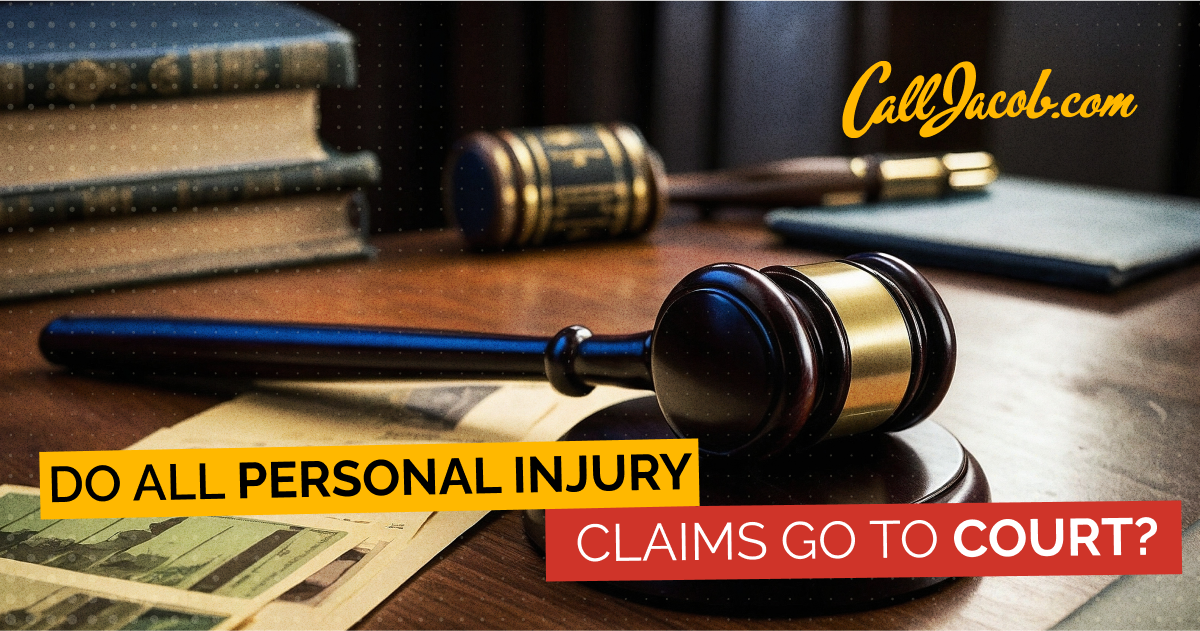According to the U.S. Department of Justice, only about 3% of personal injury claims end up in court.1 Other estimates put the settlement rate for civil cases at about 95%.2 This means most lawsuits conclude with an out-of-court settlement. Filing a personal injury claim involves many steps before reaching either scenario. But here, we’ll examine why most claims are settled before trial and why a case can go to court.
Why Most Personal Injury Claims Don’t Go to Court
If you have a personal injury claim, your attorney will gather documents and evidence to support your case and share information with the other side (during discovery, which can take several months). The process can go on for quite some time, and preparing for a trial takes even longer. Here’s why your personal injury claim is most likely to end in a settlement rather than go to trial:
- Insurance Companies Try to Avoid Trials: A well-prepared legal claim serves as greater leverage to negotiate. However, a trial is expensive even for an insurance company. Trials can be unpredictable so, along with managing costs, settling a claim helps reduce risk. A jury verdict can result in having to pay an even higher settlement; plus, it’s also considered public record, so it can put the insurance company’s reputation on the line.
- The Settlement Amount Is Too Low to Cover Court Costs: The plaintiff may be looking for a larger settlement to cover their accident-related expenses. However, legal fees and court costs may be so high that it’s cheaper for the defendant to agree to a settlement.
- The Defendant’s Insurer Offers a Comparable Settlement: If the defendant’s insurance company offers the plaintiff a settlement amount that’s similar to what they’d win at trial, the usual approach is to avoid going to court.
- Trials Take Time: Lawsuits can last from a few months to a year or more. Preparing for a case requires even more time and resources than filing a claim. First, hearings and trial dates must be set on a busy court’s schedule. Then, not only do you have less control over the outcome (the jury verdict can go against you), but the other side can appeal the decision, potentially dragging the case on for several more years.
- Accepting a Settlement Means You’re Assured Compensation: You are guaranteed some level of compensation for your losses if you agree to a settlement. Nothing is lost after both sides sign off on the contract. It works for the defendant too. Once they settle, they’re not required to admit liability.
What Factors Influence Whether a Case Goes to Trial?
Few cases reach the trial phase. Nonetheless, there are a few reasons a personal injury case may go this far. Whether a case settles or goes to trial can be determined by the extent of the plaintiff’s injuries, their medical and rehabilitation expenses, and their income and earning capacity. Long, costly recoveries involving lost wages and property damage may justify going to trial.
Other reasons a personal injury claim may lead to a trial include:
- The plaintiff wants to hold the defendant publicly accountable.
- The plaintiff’s attorney is demanding too high an amount.
- The defendant’s attorney thinks their client has a high chance of winning.
- The defendant’s insurer believes settling this type of case sets the wrong precedent.
How Do I Increase the Odds of Winning a Trial?
To start, you need an experienced attorney to handle your personal injury claim. If your lawyer has won similar cases, your case is more likely to have a favorable outcome. Another way to win a case is to have as much evidence as possible to back your claims. Witnesses who can testify effectively based on your story and provide supporting facts (i.e., medical professionals or accident investigators) can also boost your chances of winning.
Can a Trial Be Avoided If I Have a Challenging Case?
A settlement can be reached at any point during a lawsuit or trial. Additional steps can be taken before a trial starts. These include arbitration, where an arbitrator meets with both parties, reviews the evidence, and determines who wins. The decision cannot be appealed. Mediation is another option; the mediator oversees a meeting between both parties and helps them reach an agreement to avoid going to court.
Call Jacob to Handle Your Personal Injury Claim
The Law Offices of Jacob Emrani has skilled personal injury attorneys who will review your case, demand compensation from the defendant or their insurer, and represent you during negotiations. When there’s no acceptable offer, our team will file a personal injury lawsuit. Most claims never go to trial and we’ve won millions of dollars in damages for our clients over the years. For a free consultation and help with your personal injury claim, call (888) 952-2952.
Sources:



